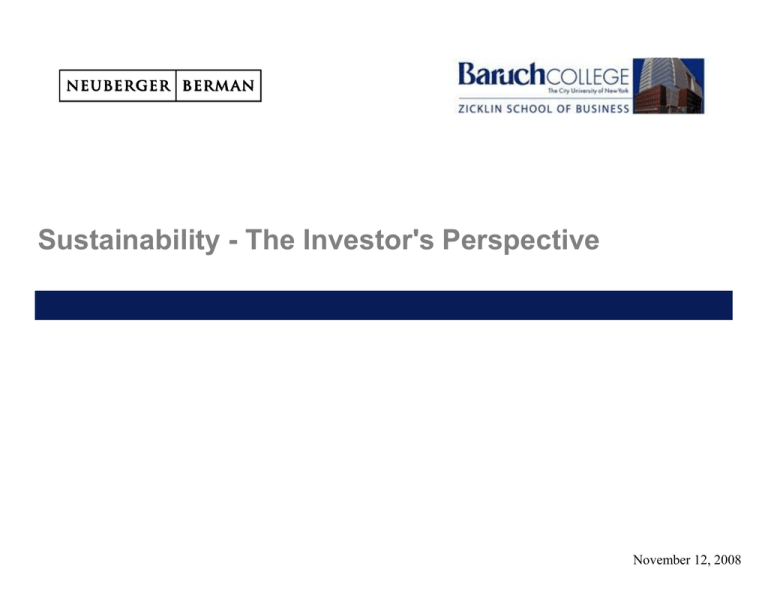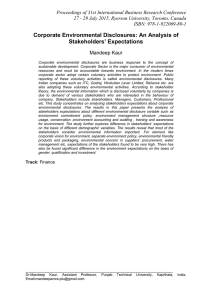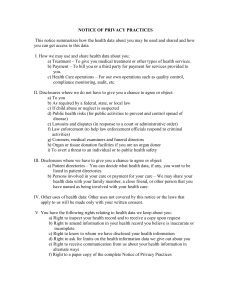
Sustainability - The Investor's Perspective
November 12, 2008
Backdrop to Investing Today
Majority of Investors
– Concern over safety of financial markets
– Lack of confidence in corporate management
– Want their financial advisors to investigate the ethical as well as the financial performance
of companies
This material is intended as a broad overview of the portfolio managers’ style, philosophy and process and is subject to change without notice. The portfolio
managers’ views may differ from those of other portfolio managers as well as the views of Neuberger Berman, LLC. Opinions expressed are as of the date herein
and are subject to change without notice. This material is not intended to be a formal research report and should not be construed as an offer to sell or the
solicitation of an offer to buy any security. Past performance is not indicative of future results. This material is not intended to address every situation, nor is it
intended as a substitute for the legal, accounting or financial counsel of your professional advisors with respect to your individual circumstances. We recommend
these factors be considered before an investment decision is made. Please see important disclosures on page 16.
1
What Is Social Responsive Investing?
– Socially responsible investing (SRI) is an investment process that considers the social
and environmental consequences of investments, both positive and negative, within the
context of rigorous financial analysis(1)
Our goal is to deliver consistent and superior risk adjusted portfolio returns, while reflecting
social and environmental criteria
We believe doing good and doing well are mutually compatible
________________
1. Source: 2005 Report on Socially Responsible Investing Trends in the United States, Social Investment Forum.
Please see important disclosures on page 16.
2
How was SRI Founded?
Driving Forces
Anti-War Movement
Nuclear
South Africa Apartheid
Environmental Concerns
Healthcare – Tobacco
Workplace and
Corporate Governance
Clean / Green Tech Revolution
Please see important disclosures on page 16.
3
Active Participants
Individuals
Institutions
– Women
– Churches
– Religious Citizens
– Hospitals
– Educators
– Foundations
– Health Professionals
– University Endowments
– Environmentalists
– Non-Profit Organizations
– Concerned Citizens
– Pensions Plans
Please see important disclosures on page 16.
4
State of SRI Industry
Rapid Growth
Assets
– From 1995 to 2007, SRI grew 324% –
faster than all professional managed
investment assets
($bn)
3,000
– SRI assets increased 18% between 2005
and 2007 – despite 38 fewer funds using
tobacco screening
2,710
2,250
1,500
750
639
0
1995
2007
________________
Source: 2005 Report on Socially Responsible Investing Trends in the United States, Social Investment Forum.
Please see important disclosures on page 16.
5
SRI Investment Approaches
Investment Policy
Social Policy
– Index-like
– Activists
– Directed
– Facilitators
– Active
– Conscientious
Please see important disclosures on page 16.
6
SRI Equity Investment Philosophy
Value-Driven Bottom-Up Investment Approach with Disciplined Risk Controls
– Research driven, valuation sensitive investing
• Deploy best ideas in diversified portfolio of approximately
30–40 names
• Buy as value / sell as growth
• Target 15–25% returns per annum per holding upon purchase
– Use long-term perspective to investment advantage
– Portfolio P/E less than Market controls valuation risk
– Strive to deliver superior long-term portfolio returns through stock selection
Please see important disclosures on page 16.
7
Investment Process Overview
Combines Quantitative Screening with Qualitative Analysis
1. Quantitative Screening
•
Find statistical values consistent with basic social avoidance criteria
2. Qualitative Business Analysis with Integrated Social Research
•
Conduct in-depth research and analysis of company / business model
•
Identify companies demonstrating leadership in environment, workplace, community
3. Develop the Investment Premise
•
Integrate valuation analysis and fundamental research to form risk / return profile
4. Buy / Sell Discipline
•
Determine catalysts that lead to investment action
•
Ensure that portfolio companies adhere to social criteria
5. Portfolio Construction and Return Characteristics
•
Valuation based portfolio risk controls
•
Seek superior long-term returns through stock selection
Please see important disclosures on page 16.
8
SRI Equity Screening
Good Corporate Citizenship Is Good Business
–
Workplace
–
Community
–
Environment
–
Corporate Governance
Please see important disclosures on page 16.
9
Workplace Issues and the Bottom Line
Social Screening Results
Employee
Benefits
Family
Benefits
Diversity
May Result in
– Lower Turnover and Absenteeism
– Higher Productivity
– Attracting and Retaining Talent
Please see important disclosures on page 16.
10
Labor
Relations
Employee
Safety
Community and the Bottom Line
Social Screening Results
Charitable
Giving
Employee
Volunteer Programs
May Result in
– Improved Corporate Image
– Heightened Product Visibility
– “Right to Operate”
– Customer Loyalty
Please see important disclosures on page 16.
11
Community
Outreach
Environment and the Bottom Line
Social Screening Results
Environmental
Management
Resource
Conservation
Waste
Reduction
May Result In
in
– Lower Resource and Disposal Costs
– Lower Penalties, Liabilities and Contingencies
– Access to New Markets
Please see important disclosures on page 16.
12
Green
Products
Corporate Governance Issues
Social Screening Results
Board
Independence
Board
Diversity
May Result in
– Management aligned with shareholder interest
– Improved Oversight, Transparency
– Increased Accountability
Please see important disclosures on page 16.
13
Executive
Compensation
Leveraging Ownership
The Active Shareholder
–
Dialogue with Management
–
Proxy Voting
–
Shareholder Resolution
Please see important disclosures on page 16.
14
Looking Ahead
SRI Trends
– Increased Disclosure
– Beyond Regulations
– Growing Pension Fund Involvement
– Green Clean Technology
– Underserved Communities
Please see important disclosures on page 16.
15
Disclosures
Socially Responsive Investing
Neither Neuberger Berman nor its employees provide tax or legal advice. All investors are strongly urged to consult their own tax or legal
advisors with respect to the impact on their personal situation of any potential strategy or investment.
This document is for informational purposes only and it should not be regarded as an offer to sell or as a solicitation of an offer to buy the
securities or other instruments mentioned in it. No part of this document may be reproduced in any manner without the written permission of
Neuberger Berman, LLC. Information in this document may have been obtained from various sources; we do not represent that this
information is accurate or complete and it should not be relied upon as such. Opinions and information expressed herein are current as of this
date and are subject to change without notice. The products mentioned in this document may not be eligible for sale in some states or
countries, nor suitable for all types of investors; their value and the income they produce may fluctuate and / or be adversely affected by
exchange rates, interest rates, or other factors. Additional information will be provided upon request. Neuberger Berman, LLC and Lehman
Brothers Inc. are affiliated registered Investment Advisers and Broker Dealers. Members NYSE/FINRA/SIPC.
© 2008 Neuberger Berman, LLC. All rights reserved.
16



